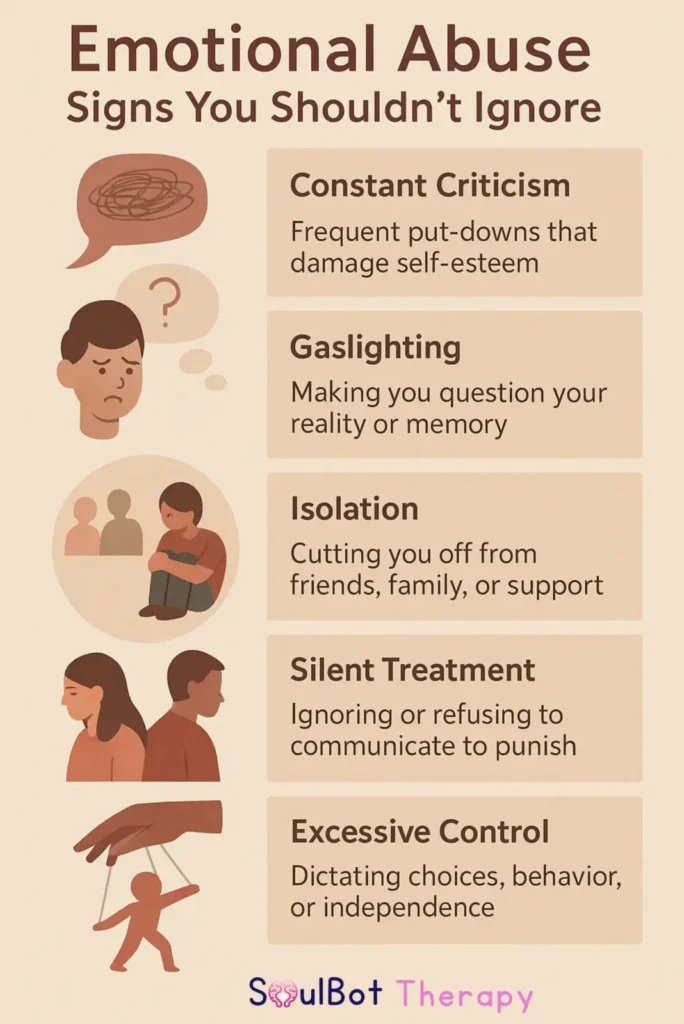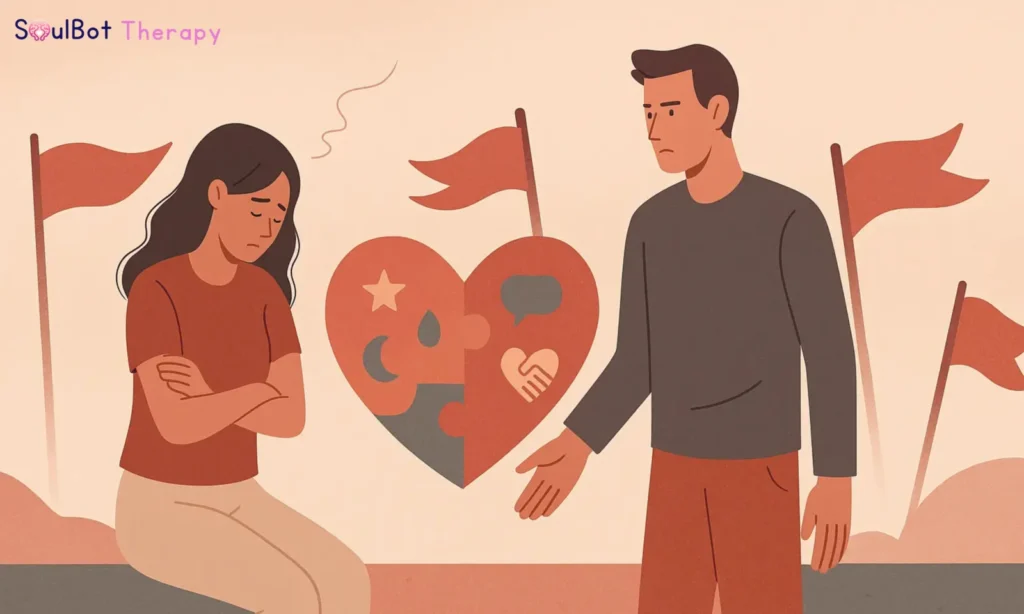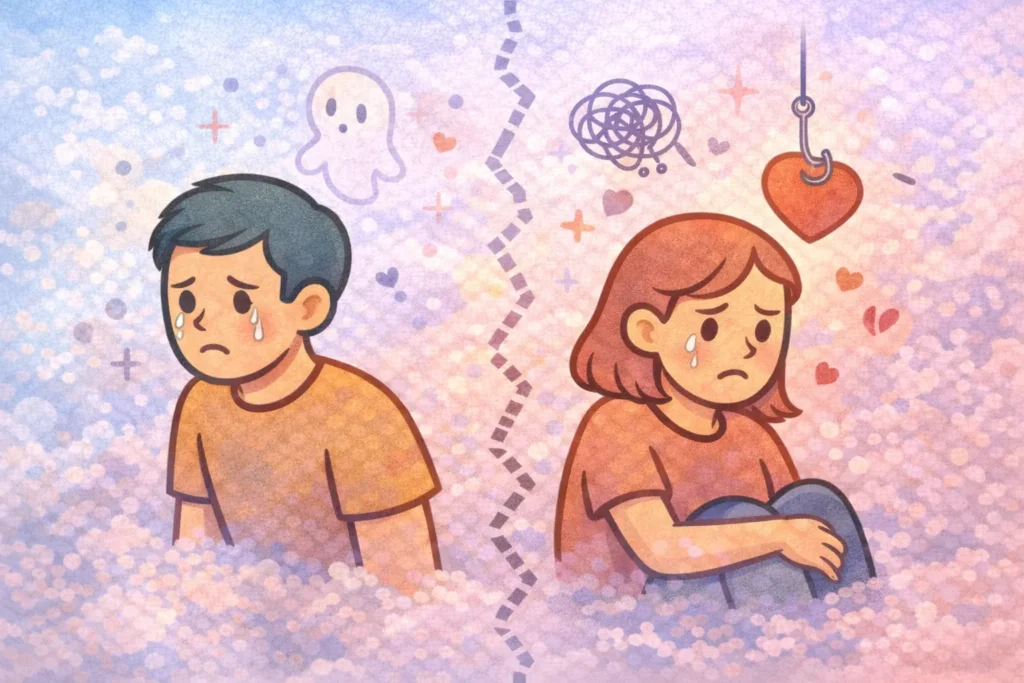1 in 3 people stay in toxic relationships for over a year before realizing it. Feeling drained, anxious, or invisible in your partnership isn’t normal; it’s a red flag.
🤔 Often, the signs are subtle; little behaviors that slowly chip away at your emotional well-being. Recognizing toxic relationship signs early can protect your mental health and help you make empowered decisions.
In this guide, we’ll explain red flags, how they affect your mind, and practical tips on what to do if you notice unhealthy patterns.
👉 Want to uncover your personality type? Take our MBTI Test and check what your personality says about you.What Are the Most Common Toxic Relationship Signs?
Not all red flags are obvious. Here are the most common toxic relationship signs you shouldn’t ignore:
| Toxic Behavior | What does it look like? | Impact |
| Constant Criticism | Belittling, mocking, or joking at you | Lowers self-esteem |
| Controlling Behavior | Dictating clothes, friends, or money | Reduces personal freedom |
| Gaslighting | Twisting facts, denying events, and blaming | Confuses reality, erodes trust |
| Emotional Neglect | Lack of support, affection, attention | Causes loneliness |
| Jealousy & Possessiveness | Unjust accusations, limiting friendships | Creates anxiety and fear |
💡 SoulFact: According to Psychology Today, subtle patterns of criticism and control are often early indicators of more serious abuse.
How Do Red Flags in Relationships Affect Mental Health?
Toxic relationships don’t just hurt emotionally; they can leave long-lasting mental health effects. Here’s what research shows:
😰Anxiety & Hypervigilance: Constant criticism and unpredictable behavior keep your nervous system on high alert.
😔Depression & Low Self-Esteem: Persistent emotional abuse diminishes self-worth and confidence.
🧠 PTSD Symptoms: Gaslighting and manipulation can create trauma-like reactions.
🤝Difficulty Trusting Others: Unhealthy patterns may make forming new relationships challenging.
📌 Reference: APA’s Warning Signs of Abusive Relationships notes that early recognition of toxic behaviors can prevent long-term psychological damage.
What’s the Difference Between Normal Conflict and Toxicity?
Every relationship experiences disagreements. But normal conflict differs from toxic patterns in these ways:
| Normal Conflict | Toxic Behavior |
| Occasional disagreements | Constant criticism or blaming |
| Respectful communication | Yelling, threats, or humiliation |
| Problem-solving together | One partner dominates or dismisses feelings |
| Temporary emotional ups and downs | Persistent anxiety, guilt, or fear |
| Mutual accountability | Only one partner is responsible for issues |
💡 Tip: Ask yourself: “Do I feel safe, respected, and supported most of the time?” If the answer is no, these are red flags in relationships.
What Are Emotional Abuse Signs You Shouldn’t Ignore?
Emotional abuse can be subtle but damaging. Watch for these emotional abuse signs:
- Gaslighting: They constantly question your reality.
- Blame-Shifting: You are always at fault, even for things outside your control.
- Silent Treatment: Punishes you by withdrawing affection or communication.
- Excessive Criticism️: Makes you feel “never good enough.”
- Isolation: Limits your contact with friends or family.
⚠️ Overlooking these warning signs may strengthen toxic relationship habits and negatively impact your mental health over time.

How Can You Tell if a Relationship Is Truly Unhealthy?
Here’s a checklist to help you evaluate toxic relationship signs:
- Do you feel constantly anxious or drained around your partner?
- Are you holding back your opinions because of fear or judgment?
- Is there a pattern of control, manipulation, or neglect?
- Do you make excuses for their behavior repeatedly?
- Are your boundaries regularly ignored?
💡 SoulFact: Understanding unhealthy relationship patterns early can prevent long-term psychological consequences and improve your overall mental health.
What Steps Can You Take if You Notice Toxic Patterns?
Taking action can feel scary, but it’s crucial for emotional well-being. Here are practical steps:
1. Acknowledge the Problem ✅
Recognise and name the toxic behaviours without minimising them.
2. Set Clear Boundaries 🚧
Communicate what behaviours are unacceptable and stick to them consistently.
3. Seek Professional Support 🧑⚕️
Therapy helps you navigate emotions, offering insights to make thoughtful and empowered choices.
4. Build a Support Network 👥
Friends, family, and support groups provide validation and guidance.
5. Consider Emotional Detachment 💭
If necessary, slowly detach to regain mental and emotional balance.
Final Thoughts: Protect Your Mental Health and Emotional Safety
Recognizing toxic relationship signs is not about labeling your partner; it’s about protecting yourself and prioritizing your mental health.
Think of these red flags as signals, not your destiny. Awareness empowers you to make choices that promote emotional safety and long-term happiness.
👉 If these signs feel familiar, don’t wait. Chat with SoulBot today for boundary-setting strategies.







